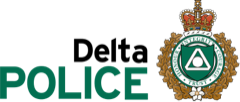
Sections of the DPD
The Chief Constable is the leader of the DPD and is delegated the overall responsibility for leading the department in delivering policing services to Delta.
The Deputy Chiefs serve as a leaders of the DPD, in conjunction with the Chief Constable. Deputy Davey and oversees the Administration Bureau; with Deputy Sidhu oversees the Investigative Bureau.
The Crime Reduction Unit is an intelligence led team that conducts enforcement in criminal investigations, with a focus on street level property and drug crimes.
The Communications Section (also known as Media) oversees both internal and external communications, assists with departmental photography and videography needs, manages social media platforms and media related matters.
The DCPO's are located throughout Delta and work with community members to promote safety and protect their neighborhoods through various community initiatives and programs. Volunteers are an integral part of the DCPO operations.
The Equity, Diversity, and Inclusion Unit (EDIU) was established to centralize and support the ongoing efforts of DPD members engaged with Delta’s faith-based, not-for-profit-based, and diversity-based community leaders, groups, and organizations including, but not limited to: LGBTQ2S+, BIPoC, and people with disabilities.
The Fraud Section deals with economic and cybercrime related matters.
Human Resources is responsible for all things employee-related, such as recruiting, hiring, onboarding, training, promoting and salary.
DPD’s Intel Section includes Analysts and sworn members who assist the Department in intelligence related matters such as attempting to forecast crime and disorder by collecting, evaluating, analyzing and disseminating accurate and timely intelligence on individuals and groups who are known to, or suspected to, be involved in criminal activity in Delta.
Investigative Services investigates a wide range of criminal offences from homicide to sexual assaults; to drugs and fraud and also aims to reduce the impact of crime on citizens of Delta by utilizing enforcement.
The Major Crime Section deals with complex investigations and crimes such as homicides, missing persons and robberies.
There are approximately 80 officers working in the Patrol section. These officers are the front line as they are the first responders to the public’s calls for service. It is these uniformed patrol officers that provide the visible policing presence on Delta streets, focusing resources to address the problems that present the greatest risk to the community. These officers work a four days on four days off, twelve hour shift rotation.
Structure
The uniformed Patrol officers are the largest section of officers in the Department, and are divided based on our area ownership model.
- District 1 – Tsawwassen
- District 2 – Ladner
- District 3 & 4 – North Delta.
These four districts are then further broken down into zones and Patrol officers are assigned to a specific zone. All Patrol officers respond to calls wherever they occur, however, the zone officer connects with the community and addresses concerns that may be present in their assigned zone.
The Patrol Support Team assists the Patrol Section in day to day matters and ongoing community concerns, with focus on enforcement.
The Professional Standards Section investigates allegations of misconduct by members of the Delta Police Department, and resolves matters of concern by the members of the public.
The Public Safety Operations group is involved in both strategic and tactical operations as they relate to emergency planning, community events planning, public order/crowd control and oversees the Reserve Constable Program.
The Recruiting Section is responsible for bringing in new recruits and experienced exempt members to the DPD Team.
The School Liaison Program is designed to build a strong relationship between police and youth to influence them in becoming responsible members of the community. The School Liaison Officers (SLOs) serve the 18,000 youth in the Delta school community. The Youth Liaison Officer (YLO) position works with youth at risk, giving them the opportunity to get their lives back on track. The YLO brings youth, their families, teachers and police together to work out a support strategy for the youth at risk.
Some DPD members are seconded to integrated units within the RCMP, such as the Lower Mainland Integrated Police Dog Services (LMIPDS), Combined Forces Special Enforcement Unit (CFSEU) and the Emergency Response Team (ERT)
The Delta Police Traffic Section is comprised of three components; enforcement officers, collision analysts, and commercial vehicle inspectors. Through education, enforcement, and engineering, the Traffic Section is committed to keeping the roads in Delta safe for everyone.
The TSDU focuses on vehicles and goods travelling through Delta. The Unit is comprised of two constables/handlers and their highly trained dogs, Ziva and Remi. The dogs assist the two officers in detecting drugs and firearms.
The Training Section delivers various forms of ongoing training to the DPD team.
The TFNST is a specialty policing section, with a group of dedicated officers who work solely on the Tsawwassen First Nation, providing policing services on the Tsawwassen First Nation Land.
The Vulnerable Sector Unit includes:
Sexual Offences Section (SOS): deals with investigations related to sexual offences.
Domestic Violence Unit (DVU): takes conduct of files where there are domestic violence issues.
Mental Health Unit (MHU): takes conduct of files where mental health is suspected to be a contributing factor, and assists those who may need ongoing monitoring and community resources.
